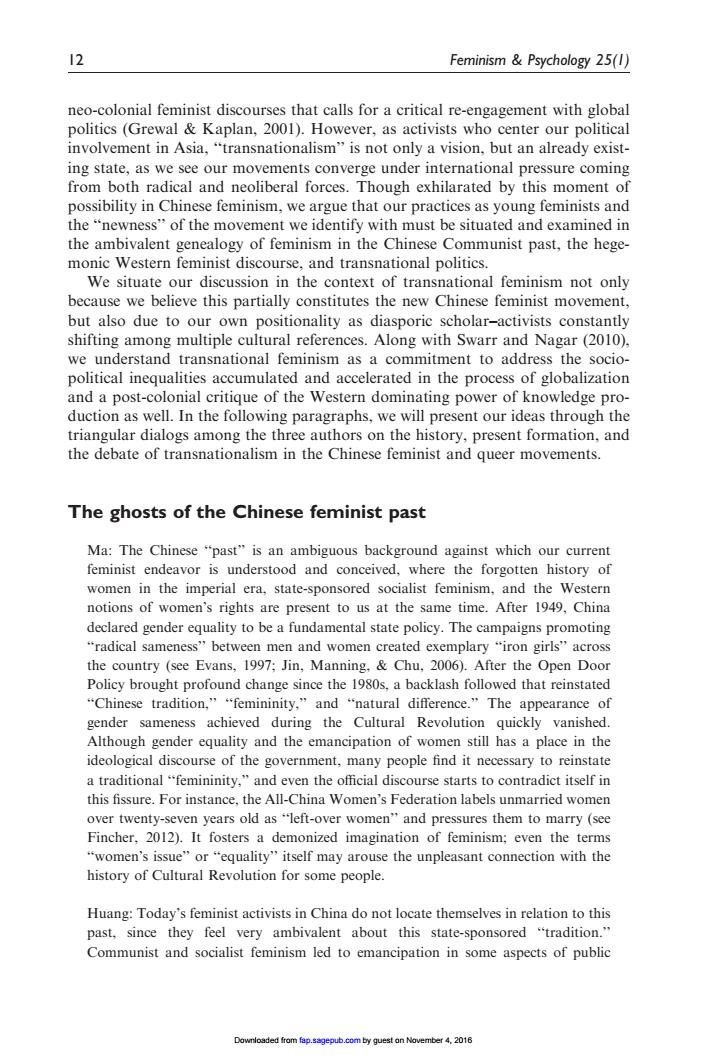正在加载图片...

12 Feminism Psychology 25(1) neo-colonial feminist discourses that calls for a critical re-engagement with global politics (Grewal Kaplan,2001).However,as activists who center our political involvement in Asia,"transnationalism"is not only a vision,but an already exist- ing state,as we see our movements converge under international pressure coming from both radical and neoliberal forces.Though exhilarated by this moment of possibility in Chinese feminism,we argue that our practices as young feminists and the"newness"of the movement we identify with must be situated and examined in the ambivalent genealogy of feminism in the Chinese Communist past,the hege- monic Western feminist discourse,and transnational politics. We situate our discussion in the context of transnational feminism not only because we believe this partially constitutes the new Chinese feminist movement, but also due to our own positionality as diasporic scholar-activists constantly shifting among multiple cultural references.Along with Swarr and Nagar(2010), we understand transnational feminism as a commitment to address the socio- political inequalities accumulated and accelerated in the process of globalization and a post-colonial critique of the Western dominating power of knowledge pro- duction as well.In the following paragraphs,we will present our ideas through the triangular dialogs among the three authors on the history,present formation,and the debate of transnationalism in the Chinese feminist and queer movements. The ghosts of the Chinese feminist past Ma:The Chinese "past"is an ambiguous background against which our current feminist endeavor is understood and conceived,where the forgotten history of women in the imperial era,state-sponsored socialist feminism,and the Western notions of women's rights are present to us at the same time.After 1949,China declared gender equality to be a fundamental state policy.The campaigns promoting "radical sameness"between men and women created exemplary "iron girls"across the country (see Evans,1997:Jin,Manning,Chu,2006).After the Open Door Policy brought profound change since the 1980s,a backlash followed that reinstated “Chinese tradition,”“femininity,”and"natural difference.”The appearance of gender sameness achieved during the Cultural Revolution quickly vanished. Although gender equality and the emancipation of women still has a place in the ideological discourse of the government,many people find it necessary to reinstate a traditional"femininity,"and even the official discourse starts to contradict itself in this fissure.For instance,the All-China Women's Federation labels unmarried women over twenty-seven years old as"left-over women"and pressures them to marry (see Fincher,2012).It fosters a demonized imagination of feminism;even the terms "women's issue"or "equality"itself may arouse the unpleasant connection with the history of Cultural Revolution for some people. Huang:Today's feminist activists in China do not locate themselves in relation to this past,since they feel very ambivalent about this state-sponsored "tradition." Communist and socialist feminism led to emancipation in some aspects of public Downloaded from fap.sagepub.com by guest on November 4.2016neo-colonial feminist discourses that calls for a critical re-engagement with global politics (Grewal & Kaplan, 2001). However, as activists who center our political involvement in Asia, ‘‘transnationalism’’ is not only a vision, but an already existing state, as we see our movements converge under international pressure coming from both radical and neoliberal forces. Though exhilarated by this moment of possibility in Chinese feminism, we argue that our practices as young feminists and the ‘‘newness’’ of the movement we identify with must be situated and examined in the ambivalent genealogy of feminism in the Chinese Communist past, the hegemonic Western feminist discourse, and transnational politics. We situate our discussion in the context of transnational feminism not only because we believe this partially constitutes the new Chinese feminist movement, but also due to our own positionality as diasporic scholar–activists constantly shifting among multiple cultural references. Along with Swarr and Nagar (2010), we understand transnational feminism as a commitment to address the sociopolitical inequalities accumulated and accelerated in the process of globalization and a post-colonial critique of the Western dominating power of knowledge production as well. In the following paragraphs, we will present our ideas through the triangular dialogs among the three authors on the history, present formation, and the debate of transnationalism in the Chinese feminist and queer movements. The ghosts of the Chinese feminist past Ma: The Chinese ‘‘past’’ is an ambiguous background against which our current feminist endeavor is understood and conceived, where the forgotten history of women in the imperial era, state-sponsored socialist feminism, and the Western notions of women’s rights are present to us at the same time. After 1949, China declared gender equality to be a fundamental state policy. The campaigns promoting ‘‘radical sameness’’ between men and women created exemplary ‘‘iron girls’’ across the country (see Evans, 1997; Jin, Manning, & Chu, 2006). After the Open Door Policy brought profound change since the 1980s, a backlash followed that reinstated ‘‘Chinese tradition,’’ ‘‘femininity,’’ and ‘‘natural difference.’’ The appearance of gender sameness achieved during the Cultural Revolution quickly vanished. Although gender equality and the emancipation of women still has a place in the ideological discourse of the government, many people find it necessary to reinstate a traditional ‘‘femininity,’’ and even the official discourse starts to contradict itself in this fissure. For instance, the All-China Women’s Federation labels unmarried women over twenty-seven years old as ‘‘left-over women’’ and pressures them to marry (see Fincher, 2012). It fosters a demonized imagination of feminism; even the terms ‘‘women’s issue’’ or ‘‘equality’’ itself may arouse the unpleasant connection with the history of Cultural Revolution for some people. Huang: Today’s feminist activists in China do not locate themselves in relation to this past, since they feel very ambivalent about this state-sponsored ‘‘tradition.’’ Communist and socialist feminism led to emancipation in some aspects of public 12 Feminism & Psychology 25(1) Downloaded from fap.sagepub.com by guest on November 4, 2016